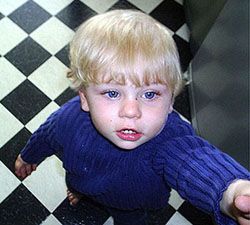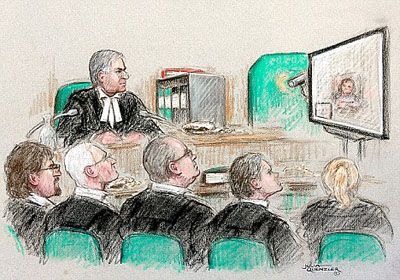"Did you make it up?"
"Whose idea was it?"
"Did you think it up by yourself?"
"I have to wait until I get your answer. He didn't touch you, did he?"
"Do you remember that you said to me, that you didn’t tell fibs? Is that true or a fib?"
"What is truth?"
Th e above questions were asked in court last week of a four-year old girl, who had been raped at the age of two, by Bernard Richmond QC (left), who was representing the accused. The thing that initially jumped out at me about the aggravated interrogation above was that I'd heard the last question before, which Jesus declined to answer Pilate. So Richmond was possibly being overoptimistic if he realistically expected an answer from a violated toddler. (Photos can't be taken in British courts; the picture below, linked to Caroline Gammell's account of the trial, was drawn by court artist Julia Quelzler.)
e above questions were asked in court last week of a four-year old girl, who had been raped at the age of two, by Bernard Richmond QC (left), who was representing the accused. The thing that initially jumped out at me about the aggravated interrogation above was that I'd heard the last question before, which Jesus declined to answer Pilate. So Richmond was possibly being overoptimistic if he realistically expected an answer from a violated toddler. (Photos can't be taken in British courts; the picture below, linked to Caroline Gammell's account of the trial, was drawn by court artist Julia Quelzler.)
If. As Richmond told the Times in a 2008 feature entitled Actually, crime does pay, and it's fun, [the consequences of] "underperforming...can be horrendous".
And Bernard Richmond was certainly under pressure to perform. The man who rap ed the girl was not new to allegations of child abuse, having been found guilty in November 2008 of "causing or allowing the death" of Baby P (now known as Peter), who had been on the London Borough of Haringey Social Services Department's books as a child in need, having been seen by social workers, police and medical personnel on 60 occasions, sustaining 50 injuries in that period. However, Baby Peter was not categorised as a child at risk of immediate/ongoing harm, which is a step up from being noted as a child in need.
ed the girl was not new to allegations of child abuse, having been found guilty in November 2008 of "causing or allowing the death" of Baby P (now known as Peter), who had been on the London Borough of Haringey Social Services Department's books as a child in need, having been seen by social workers, police and medical personnel on 60 occasions, sustaining 50 injuries in that period. However, Baby Peter was not categorised as a child at risk of immediate/ongoing harm, which is a step up from being noted as a child in need.
Having been involved in drugs-work in various places, it depressed me to observe that the objective needs of a child are only one side of the coin as regards a decision whether to upgrade a child's need of observation and/or intervention: the other factor is the number of social workers and their caseloads, which causes the threshold for upgrading to rise (usually) or fall.
The head o f Haringey Social Services Department, Sharon Shoesmith (left), not only refused to resign after the catalogue of professional abrogations of duty leading to Baby P's death, but proceeded to lead the official investigation into what had gone wrong - a course of action lambasted as "totally unacceptable" by David Cameron at Prime Minister's Questions in the House of Commons. Shades, indeed, of Cynthia Bower, who failed to pick up hundreds of unneccessary deaths in Stafford General Hospital when she headed the body charged with monitoring it, taking the top post at the Care Quality Commission to be responsible for the enquiry for...deaths at Stafford Hospital.
f Haringey Social Services Department, Sharon Shoesmith (left), not only refused to resign after the catalogue of professional abrogations of duty leading to Baby P's death, but proceeded to lead the official investigation into what had gone wrong - a course of action lambasted as "totally unacceptable" by David Cameron at Prime Minister's Questions in the House of Commons. Shades, indeed, of Cynthia Bower, who failed to pick up hundreds of unneccessary deaths in Stafford General Hospital when she headed the body charged with monitoring it, taking the top post at the Care Quality Commission to be responsible for the enquiry for...deaths at Stafford Hospital.
The reason, at root, for the madness gripping Britain today lies in a high-level dissociation of consequences for one's career from the consequences of one's performance in the real world. As historian David Starkey put it, even the 16th-century machiavellian English king Henry VIII led a culture where success was rewarded and failure punished, and governed Britain better than Gordon Brown. In true form, Ofsted - the Government office for, among other things, children's services - gave Haringey Council a glowing report which included an apotheosis of Sharon Shoesmith written by an ex-colleague weeks after Peter's death (but before it had become public knowledge); in other words, a whitewash.
failure punished, and governed Britain better than Gordon Brown. In true form, Ofsted - the Government office for, among other things, children's services - gave Haringey Council a glowing report which included an apotheosis of Sharon Shoesmith written by an ex-colleague weeks after Peter's death (but before it had become public knowledge); in other words, a whitewash.
And after the fashion of a whitewash, the Secretary of State for Children, Schools and Families, Ed Balls, has announced that managers will be sent on a "new training regime". That is unnecessary. What is needed is for senior managers to be forced to implement reforms demanded by Lord Laming's enquiry, published 2003, into the death in 2000 of Victoria Climbié (below left), who was known to be a child in need by social services - in Haringey. Method of force: reward success (bonuses or promotion), punish failure (demotion or the  sack).
sack).
The culture whereby a tome of ticked boxes is enough to guarantee praise and promotion must be brought to an end. This would, of course, entail a shake-up of trees that would send figures plunging from their pedestals right up to Government level. That indicates the sort of pressure Bernard Richmond QC was under to perform, including asking a question of a four-year-old that Jesus left unanswered.
Related post: Human rights: a done deal for some, torture for others












In pc Britain, the connection between child abuse and the structure of the family is taboo. The state cannot replace the family which is irreplaceable in the social order. The idea that a family has an objective character, or that it is best formed around marriage is now so scorned in this country that children will continue to suffer as a consequence. But there's no telling some people, even when years of social studies data tell the same story again and again.
ReplyDeleteI agree. If professionals of a certain ideological bent and ambition can find a family which is in xome way "dysfunctional" or "alternative", they can then provide "input" which will tick all the right boxes, no matter the chaos caused to communities and suffering, as we've seen, to young people.
ReplyDeleteGood to see you in the draughty old fen!